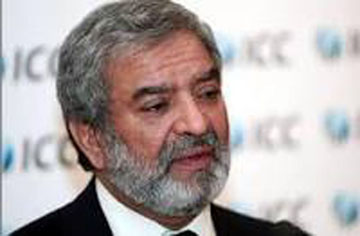LONDON, (Reuters) – Former International Cricket Council (ICC) president Ehsan Mani says it would be “sheer madness” for the governing body to effectively hand over control of the sport to India, Australia and England.
It was announced after a board meeting in Dubai last month that a new five-member ICC executive committee would be established to include representatives from the ECB, Cricket Australia and the Board of Control for Cricket in India.
However, the plan has received widespread criticism.
The current executive committee includes representatives from all 10 test-playing countries, and some suggest the new proposals will allow the ‘Big Three’ to take over at the expense of other cricketing nations.
“If these proposals are accepted then the Big Three will decide how the ICC runs and what it does,” Mani told Reuters in a telephone interview from his home in Islamabad.
“The board of the ICC cricket council will effectively have no powers apart from approving whatever India, Australia and England do.

“If these proposals are accepted they are going to be doing severe damage to world cricket. It would seriously affect the credibility of the ICC as the governing body.”
Mani believes three of the 10 test-playing nations will reject the new proposals.
“As far as I know South Africa, Sri Lanka and Pakistan will not vote for it and without those three this cannot go through,” said the 68-year-old businessman who was president of the ICC between 2003-06.
“Do you really want to run World Cups and such like without these countries and without South Africa who are the number one-ranked test team in the world? That would be sheer madness.”
India has long been regarded as the traditional powerhouse among the test-playing nations and the Pakistani says England and Australia might think again about the new proposals if they are rejected.
“What will be interesting is what the Big Three will do if the plan is blocked,” said Mani.
“Bangladesh and West Indies have only supported the Big Three because they’ve been given the incentive that they will get more tours from these countries, hence more money from television rights.
“I question the morality of that but if this move is blocked, then it will be a serious time for England and Australia to think about how much damage they might be doing to the game just to fall into line with something that India wants.”
FREE-FOR-ALL

Mani said the new proposals would encourage a free-for-all scenario to develop in terms of future test series.
“Under the present Future Tours Programme every country is obliged to play every other country in a four-year cycle home and away at least once,” he explained.
“What the Big Three are saying is do away with that, let all the countries decide who they will play against, with no obligation to play any of the other members.
“So you will have a free-for-all situation that certain countries will misuse to go where they want…it will totally unsettle international cricket because members will only play against countries where they make money,” said Mani.
“It would mean they won’t be interested in countries like Bangladesh, Zimbabwe, New Zealand or possibly even West Indies where they will lose money to tour.”
Earlier this week, chairman of the ECB Giles Clarke said the new proposals would help give countries greater financial stability.
Yet Mani believes the lesser cricketing nations who are outside the 10 test-playing elite will suffer financially under the new plans.
“The Big Three are also proposing to cut the funding of the associate and affiliate members and that will kill off the development programme of the ICC,” he said.
“What they are saying is we’ll give $210 million to associate members, half of that will go to the top six countries so the other 90-odd will have to share $105 million.
“What they further say … is that the new ICC executive board will decide which of those countries will get money and how much – that goes against the very constitution of the ICC,” Mani added.
“The constitution says the associate members will get 25 percent of ICC revenues. It doesn’t give the board of the ICC the right to decide who gets how much.
“What the executive board doesn’t appreciate is that although these countries don’t necessarily play a high standard of cricket, there are big economies involved like China and the United States that over time with the right sort of investment could give the ICC a huge amount of returns in terms of money.”
